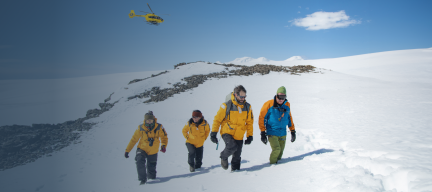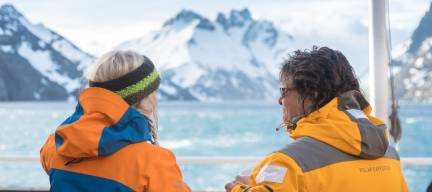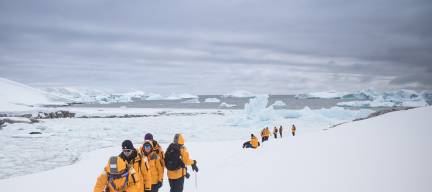Guest post by Shane Evoy, Operations Leader
Shane is an experienced leader with over 125 expeditions and seventeen years under his belt. He has led trips for the past twelve years and has also included the remote islands of the south pacific to his travel log. Shane’s objective on any trip is to make sure you have the “Trip of a Lifetime”.

Emperor penguins seen on Antarctic expedition. Photo: Dr. Tom Hart, Penguin Watch.
Like the wildly popular March of the Penguins before it, Sir David Attenborough’s critically acclaimed BBC mini-series, Frozen Planet, gave viewers worldwide an unprecedented, never-before-seen glimpse of life in the polar regions. Over the course of nine visually stunning episodes, we were guided on a deep dive into life in the polar regions, as experienced by rarely seen wildlife inhabitants.
One of the most fascinating and difficult to reach Antarctic destinations is Snow Hill, a snow-capped island 33km (20 miles) long and 12km (7 miles) wide in Graham Land, off the east coast of the Antarctic Peninsula. Back in 2004, Quark conducted its first ground visit to this extremely isolated realm of the Emperor penguin, near Snow Hill in the Weddell Sea. Two hundred and sixty-three hectares of sea ice adjacent to the coast have been identified as an Important Bird Area (IBA) by BirdLife International because of this colony.
As an Expedition Leader, I had the great pleasure of visiting Snow Hill 15 times before the Kapitan Khlebnikov was retired from service and am thrilled to share exciting news with you:
In the 2018.19 Antarctic season, you’ll have four brand new opportunities to visit this exceptional Emperor penguin colony aboard the Kapitan Khlebnikov!
Like the BBC and Discovery Channel crews and only a handful of others, you could have the opportunity to witness the spectacle of an Emperor penguin rookery thousands strong in one of the least accessible places on the planet.
The Making of Frozen Planet: Unparalleled Access, Expert Guidance
It was executive producer Alastair Fothergill whose fascination with the polar regions gave rise to the Frozen Planet concept. He and Attenborough had worked together since 1988 at the BBC’s Natural History Unit, the largest wildlife documentary production house in the world. Fothergill left his position as the head of the documentary unit to make The Blue Planet (2001) and Planet Earth (2006), which went on to become the bestselling non-fiction DVD ever produced, worldwide. Fothergill also produced Attenborough’s 1993 miniseries Life in the Freezer, a six-part exploration of the natural history of Antarctica.

“I had a wonderful season in 2008 working with Quark Expeditions on board their fabulous icebreaker Kapitan Khlebnikov in the Weddell Sea, Ross Sea and sub-Antarctic.” – Sue Flood.
Photo credit: Sue Flood Photography
The scenery is breathtaking. The last time I was there, this northernmost Emperor penguin colony was nestled into the shore of Snow Hill Island, with icebergs scattered around it. We landed 1.5 nautical miles (2.4km) away from the colony and walked in over the sea ice.
What Makes Snow Hill Island Emperor Penguins Unique
The Snow Hill Emperor colony has been hard for researchers to track because they’re transient and won’t stay within range of a motion-sensitive camera.
For most people, including our own Scientist-in-Residence Dr. Tom Hart, leader of Oxford University’s Penguin Watch program, the prospect of reaching this mysterious, little-visited colony is one of the most exciting aspects of his upcoming Antarctic travels.
“Emperor penguins breed on ice, which makes them totally out of sync with every other penguin species,” Dr. Hart explains. “Snow Hill is the furthest colony north and therefore the closest to Tierra del Fuego in South America, but is only accessible by icebreaker. We’re really looking forward to reaching this colony of approximately 4,000 breeding pairs of Emperors, who will have laid and hatched eggs by the time we get there.”

Emperor penguins and chicks near Snow Hill Island on the frozen Weddell Sea. Photo credit: Andy Stringer, Snow Hill Safari expedition (2009).
Hart will travel with passengers on the second Snow Hill voyage in 2018, in order to collect penguin dropping samples for DNA testing. “We want to know what diseases they carry and whether they’re the same as nearby populations outside of the Weddell Sea, or whether being further north shaped their evolution.”
Antarctic wildlife are thrilling to see in their natural environment, although sightings don’t always go as you might expect. Frozen Planet producer Vanessa Berlowitz shared her own comedic story of managed expectations with Entertainment Weekly:
“In the Southern Ocean, near Antarctica, you get these congregations of krill, which are like shrimp, and that attracts all of the marine wildlife. You can get thousands of whales — blue whales, minke whales, fin whales, humpback whales — seals, penguins, in this kind of huge feeding frenzy. We tried to time some of our penguin and orca shoots to be there at the right time and go through the areas that we thought it might happen. It never quite did. Although I think one of the most frustrating texts that I ever got was from a scientist friend of Alastair [Fothergill], our boss, who was on a fishing vessel doing science work. This fuzzy picture came through, I looked at it and said, ‘What is that?’ I started to realize it was a picture of thousands of whales. You can see fins right to the horizon. The note underneath it was, ‘Is this what you were looking for?’ (Laughs).”
We are always at the whims of the weather in Antarctica, and you should always expect the unexpected—especially when trying to reach a destination as inaccessible as Snow Hill. With that said, the return of the Kapitan Khlebnikov and its onboard helicopters gives us the best chance there is to get into that area and visit this fascinating Emperor penguin colony.
March to the Emperor Penguins in 2018
It was Alastair Fothergill who said, “The scenery in the polar regions is unmatched anywhere else on our planet… in the south, the stars are the penguins.”
The highly anticipated relaunch of this iconic polar trip guides passengers to witness one of the most captivating and rarely experienced wildlife events in Antarctica. On these four exclusive Legendary Snow Hill: March to the Emperor Penguins voyages in 2018, you’ll crush through ice, then fly high overhead by helicopter before trekking the rest of the way to the rookery on foot.
It’s an authentic polar exploration experience that brings you closer to the action than any wildlife documentary ever could.









